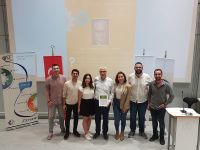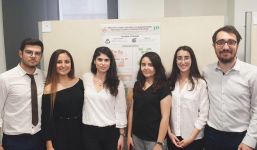
FACULTY OF ENGINEERING
Department of Industrial Engineering
IE 315 | Course Introduction and Application Information
| Course Name |
Sequencing and Scheduling
|
|
Code
|
Semester
|
Theory
(hour/week) |
Application/Lab
(hour/week) |
Local Credits
|
ECTS
|
|
IE 315
|
Fall/Spring
|
3
|
0
|
3
|
6
|
| Prerequisites |
|
|||||||
| Course Language |
English
|
|||||||
| Course Type |
Elective
|
|||||||
| Course Level |
First Cycle
|
|||||||
| Mode of Delivery | Online | |||||||
| Teaching Methods and Techniques of the Course | Group WorkProblem SolvingLecture / Presentation | |||||||
| Course Coordinator | ||||||||
| Course Lecturer(s) | ||||||||
| Assistant(s) | - | |||||||
| Course Objectives | The purpose of this highly quantitative course is to introduce students to a broad range of scheduling problems that arise in both manufacturing and service organizations, and to teach scheduling techniques, starting from basic principles, and leading to algorithms and computerized scheduling systems. The topics include machine scheduling and job shop scheduling, flexible assembly systems, interval scheduling, and workforce scheduling. The emphasis will be on systems design and implementation. |
| Learning Outcomes |
The students who succeeded in this course;
|
| Course Description | The topics include machine scheduling and job shop scheduling, flexible assembly systems, interval scheduling, and workforce scheduling. The emphasis will be on systems design and implementation. |
|
|
Core Courses | |
| Major Area Courses |
X
|
|
| Supportive Courses | ||
| Media and Management Skills Courses | ||
| Transferable Skill Courses |
WEEKLY SUBJECTS AND RELATED PREPARATION STUDIES
| Week | Subjects | Related Preparation |
| 1 | Introduction to the course. Introduction to Sequencing and Scheduling. | Planning and Scheduling in Manufacturing and services, M. L. Pinedo, 2005, Springer Chapter 1; Scheduling: Theory, Algorithms and Systems, Pinedo, M., Springer, 3e, 2008, Chapter 1 |
| 2 | Notation, Dispatching Rules | Planning and Scheduling in Manufacturing and services, M. L. Pinedo, 2005, Chapters 2,3; Scheduling: Theory, Algorithms and Systems, Pinedo, M., Springer, 3e, 2008, Chapters 2, 14 |
| 3 | Single Machine Scheduling | Scheduling: Theory, Algorithms and Systems, Pinedo, M., Springer, 3e, 2008, Chapters 3,4 |
| 4 | Single Machine Scheduling | Scheduling: Theory, Algorithms and Systems, Pinedo, M., Springer, 3e, 2008, Chapters 3,4 |
| 5 | Single Machine Scheduling | Scheduling: Theory, Algorithms and Systems, Pinedo, M., Springer, 3e, 2008, Chapters 3,4 |
| 6 | LEKIN, Review | - |
| 7 | Midterm | - |
| 8 | Flow Shop Problems | Planning and Scheduling in Manufacturing and services, M. L. Pinedo, 2005, Springer Chapter 6 |
| 9 | Flow Shop Problems | Planning and Scheduling in Manufacturing and services, M. L. Pinedo, 2005, Springer Chapter 6 |
| 10 | Parallel Machine Problems | Planning and Scheduling in Manufacturing and services, M. L. Pinedo, 2005, Springer Chapter 5; Scheduling: Theory, Algorithms and Systems, Pinedo, M., Springer, 3e, 2008, Chapter 7 |
| 11 | Job Shop Scheduling | Planning and Scheduling in Manufacturing and services, M. L. Pinedo, 2005, Springer Chapter 5; Scheduling: Theory, Algorithms and Systems, Pinedo, M., Springer, 3e, 2008, Chapter 7 |
| 12 | Open Shops. Reservation Systems | Scheduling: Theory, Algorithms and Systems, Pinedo, M., Springer, 3e, 2008, Chapter 8 |
| 13 | Project Presentations | |
| 14 | Project presentations | |
| 15 | General Course Review | |
| 16 | Final Exam |
| Course Notes/Textbooks | |
| Suggested Readings/Materials | Pinedo, M., Planning and Scheduling in Manufacturing and Services, Springer, 2005
Pinedo, M., Scheduling: Theory, Algorithms and Systems, Springer, 3e, 2008
Production Planning and Industrial Scheduling, D. R. Sule, CRC Press, 2008
Instructor notes and lecture slides. |
EVALUATION SYSTEM
| Semester Activities | Number | Weigthing |
| Participation | ||
| Laboratory / Application | ||
| Field Work | ||
| Quizzes / Studio Critiques |
1
|
20
|
| Portfolio | ||
| Homework / Assignments |
-
|
|
| Presentation / Jury | ||
| Project |
1
|
15
|
| Seminar / Workshop | ||
| Oral Exams | ||
| Midterm |
1
|
30
|
| Final Exam |
1
|
35
|
| Total |
| Weighting of Semester Activities on the Final Grade |
3
|
65
|
| Weighting of End-of-Semester Activities on the Final Grade |
1
|
35
|
| Total |
ECTS / WORKLOAD TABLE
| Semester Activities | Number | Duration (Hours) | Workload |
|---|---|---|---|
| Theoretical Course Hours (Including exam week: 16 x total hours) |
16
|
3
|
48
|
| Laboratory / Application Hours (Including exam week: '.16.' x total hours) |
16
|
0
|
|
| Study Hours Out of Class |
14
|
2
|
28
|
| Field Work |
0
|
||
| Quizzes / Studio Critiques |
1
|
20
|
20
|
| Portfolio |
0
|
||
| Homework / Assignments |
0
|
||
| Presentation / Jury |
0
|
||
| Project |
1
|
24
|
24
|
| Seminar / Workshop |
0
|
||
| Oral Exam |
0
|
||
| Midterms |
1
|
30
|
30
|
| Final Exam |
1
|
30
|
30
|
| Total |
180
|
COURSE LEARNING OUTCOMES AND PROGRAM QUALIFICATIONS RELATIONSHIP
|
#
|
Program Competencies/Outcomes |
* Contribution Level
|
||||
|
1
|
2
|
3
|
4
|
5
|
||
| 1 | To have adequate knowledge in Mathematics, Science and Industrial Engineering; to be able to use theoretical and applied information in these areas to model and solve Industrial Engineering problems. |
X | ||||
| 2 | To be able to identify, formulate and solve complex Industrial Engineering problems by using state-of-the-art methods, techniques and equipment; to be able to select and apply proper analysis and modeling methods for this purpose. |
X | ||||
| 3 | To be able to analyze a complex system, process, device or product, and to design with realistic limitations to meet the requirements using modern design techniques. |
X | ||||
| 4 | To be able to choose and use the required modern techniques and tools for Industrial Engineering applications; to be able to use information technologies efficiently. |
X | ||||
| 5 | To be able to design and do simulation and/or experiment, collect and analyze data and interpret the results for investigating Industrial Engineering problems and Industrial Engineering related research areas. |
|||||
| 6 | To be able to work efficiently in Industrial Engineering disciplinary and multidisciplinary teams; to be able to work individually. |
|||||
| 7 | To be able to communicate effectively in Turkish, both orally and in writing; to be able to author and comprehend written reports, to be able to prepare design and implementation reports, to present effectively; to be able to give and receive clear and comprehensible instructions |
|||||
| 8 | To have knowledge about contemporary issues and the global and societal effects of Industrial Engineering practices on health, environment, and safety; to be aware of the legal consequences of Industrial Engineering solutions. |
|||||
| 9 | To be aware of professional and ethical responsibility; to have knowledge of the standards used in Industrial Engineering practice. |
|||||
| 10 | To have knowledge about business life practices such as project management, risk management, and change management; to be aware of entrepreneurship and innovation; to have knowledge about sustainable development. |
|||||
| 11 | To be able to collect data in the area of Industrial Engineering; to be able to communicate with colleagues in a foreign language. |
|||||
| 12 | To be able to speak a second foreign at a medium level of fluency efficiently. |
|||||
| 13 | To recognize the need for lifelong learning; to be able to access information, to be able to stay current with developments in science and technology; to be able to relate the knowledge accumulated throughout the human history to Industrial Engineering. |
|||||
*1 Lowest, 2 Low, 3 Average, 4 High, 5 Highest
NEWS |ALL NEWS

‘Artificial Intelligence’ scholarship for IUE graduate Mert
Mert Atanmış (23), who graduated from Izmir University of Economics (IUE) Department of Industrial Engineering with the first place last year, was

He became the European champion while trying to lose weight
Yağız Hacılar, a student at Izmir University of Economics (IUE) Department of Industrial Engineering, became the European champion twice in taekwondo, which

A 'digital' model for the construction industry
Sadık Onur Özden and Tunç Çokuysal, students of Izmir University of Economics (IUE), turned the demand for digitalization in the construction industry

Faculty 101
Industrial Systems Society organized the Faculty101 seminar in our school for the students who begin to the Industrial Engineering Department to introduce






